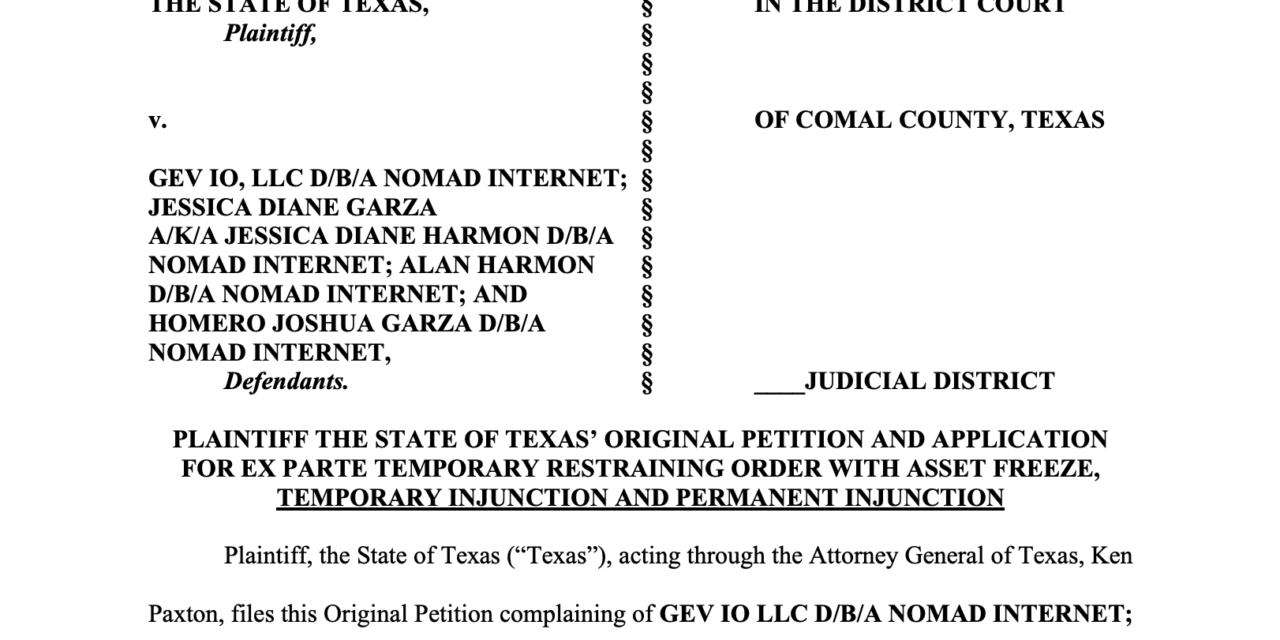By Jason Epperson
Texas Attorney General Ken Paxton has filed a lawsuit against Nomad Internet, calling its operations “an illegal scheme that often resulted in paying customers losing all internet access.” The lawsuit alleges violations of the Deceptive Trade Practices Act by GEV IO, LLC, doing business as Nomad Internet, and its owners Jessica Garza and her husband Homero Garza, who has been operating the company under the name “Jayden’ Garza.
Nomad Internet promises unlimited, unthrottled internet for people living in rural communities or traveling RVers, but the lawsuit alleges that Nomad acquired large quantities of SIM cards from legitimate wireless internet providers, reprogrammed those SIM cards to avoid detection, and then repackaged them for resale at an inflated price. Texas calls Nomad “a $75 million deceptive scheme” run from the Garza’s home in New Braunfels, Texas.
“I’ve secured a temporary injunction with an asset freeze against Nomad Internet to make sure they cannot scam any more unsuspecting consumers who are simply trying to obtain basic internet access,” said Attorney General Paxton. “My office will continue to vigilantly monitor for all companies engaging in deceptive trade practices and looking to scam Texas consumers.”
Last week, RV Miles ran a story tying Nomad Internet’s founder and CEO Jaden Garza with his past life as Homero Joshua Garza, convicted for a cryptocurrency Ponzi scheme in 2017. Mr. Garza was released from prison in 2020 under a 3-year supervised release and was ordered to pay over $9 million in restitution to past victims. RV Miles found Garza was living in a home valued at over a million dollars and had been advertising for a maid, butler, and personal assistant while still owing his past victims.

Recently, Nomad Internet was dropped by many social media influencers in the RV community due to their issues with customer service, double billing, and other issues.
The Texas AG petitioned for the surprise injunction and asset freeze, believing that the Garzas would evade service of process and destroy relevant records if prior contact was made. The filing says that Nomad Internet is the alter ego of the individual defendants (including the Garzas and an individual named Alan Harmon) who used the ill-gotten gains for personal purposes.
By selling and distributing equipment acquired without authorization, along with falsely representing their affiliation with reputable internet service providers, Texas says that Nomad Internet has engaged in “false, misleading, and deceptive acts and practices declared unlawful under the Deceptive Trade Practices Act in the state of Texas,” and that’s the crux of the lawsuit.
Texas said that the cellular SIM cards used in Nomad Internet’s devices were acquired under contracts that prohibited resale. When obtaining large quantities of SIM cards by creating business accounts was detected by the cellular carriers and then blocked, the defendants applied for thousands of individual data lines using fictional identities. Like the business account contracts, the agreements for personal lines prohibited resale. Even after network providers detected and terminated the unauthorized use of their networks, leaving consumers without internet access for which they were paying, the Garzas continued to charge consumers hefty monthly fees.
The complaint goes on to say that Nomad claimed to be a low-cost alternative to traditional internet service providers, such as AT&T, Xfinity, and Spectrum. Instead, its plans are more than triple the national average, with sign-up fees ranging in the hundreds of dollars.
Last fall, Nomad switched all or most of its plans to Verizon, saying publicly that they had an official relationship with the cellular giant. According to the lawsuit, Verizon conducted an undercover operation to determine if their SIM cards were being acquired and leased without authorization. Employees for Verizon’s Operational Assurance team acted as consumers, used Nomad Internet’s website to sign up for Nomad Internet’s “Deep Red Plan,” and received improperly acquired SIM cards, along with a device to use these SIM cards.

Operational Assurance Team
Nomad attempted to conceal their deception by defacing the SIM card in black marker over a label on the SIM card that reads “Verizon” and “Visible.” Verizon also monitored Nomad’s social media activity. They discovered the company boasting of acquiring large numbers of SIM cards they had digitally altered and promised to distribute to consumers. Investigators also worked with a Nomad Customer and AT&T to prove a sim card was obtained under false pretenses.
When internet service providers discovered their SIM cards were being used for more data than for which they agreed; or in geographic regions different than what was represented by Nomad when they purchased the plans from the cell company, they were notified that they were breaching the Terms of Service. When Defendants took no action, the internet service providers proceeded to limit the amount of data transmitted to the SIM cards, a practice known as “throttling.”

Upon the substantial slow-down in internet speeds, consumers contacted Nomad, assuming they own or have some degree of control over the internet service. Of course, because Defendants do not own or control the equipment, they did nothing except tell the consumers to return the SIM cards along with the routers in which they were delivered.
Despite the poor service provided, Nomad still charged consumers full price, often charged consumers for equipment that was never delivered, or charged consumers multiple times.
When consumers attempted to cancel, they were either told they must first return the equipment—despite often never having received the product in the first place—or were told they had successfully canceled their subscription, only to be later charged by Nomad again.
After the suit was filed, the Court approved a temporary injunction blocking the Garzas and their businesses from destroying documents or communications, shifting assets, or selling internet plans without the service provider’s consent. The injunction has provisions to keep the company operating under supervision to keep people from losing their current internet plans.
RV Miles found Garza was living in a home valued at over a million dollars and had been advertising for a maid, butler, and personal assistant while still owing his past victims.
Recently, Nomad Internet was dropped by many social media influencers in the RV community due to their issues with customer service, double billing, and other issues.
This story is being updated.








